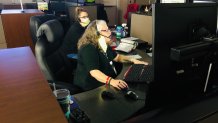As a dispatcher, you always have to be ready for the unknown.
"You never know what's going to be on the other end of the line when you pick it up," MedStar dispatcher Jamey Clark said.

But Clark knows a lot of her calls will be people concerned about possibly having symptoms of coronavirus.
"Acute on-set difficulty breathing,” Clark said. “Whereas they felt fine a few days ago and now their difficulty breathing is so severe that's it considered an emergency."
MedStar is seeing about 70 calls a day screening as potential COVID-19 cases. That's about 20% of their total call volume.
Of that number, about 34 people a day are found to be consistent with COVID-19 symptoms and advised to be tested.
Local
The latest news from around North Texas.
To keep responders safe, extra screening questions have been added when they answer a phone call.
"In the past 14 days has she been in contact with someone with suspected or confirmed coronavirus," a dispatcher asked on a call.
Those questions help determine if responders need to wear special gear on scene. All of this is a new level of concern for dispatchers.
“I won't say it hasn't come with an extra added layer of stress,” Clark said. “You know, making sure I'm getting crews, I'm sending to people there safely and to make sure they have the appropriate protective gear to make sure they are protected as well."
The protocol questions also cut down on the number of people actually taken to the hospital to prevent exposure and to preserve the hospital capacity.
In the field, paramedics are wearing masks all the time and at least one dresses in a full protective suit if it's believed the patient might have coronavirus.
Not everyone automatically gets a ride to a hospital, MedStar supervisor John Hamilton said.
"Our normal approach is, if you call we're going to treat you the best we can and get you to the hospital," Hamilton said. "But right now, that's not in your best interests, the hospital's best interests, or the city's best interest."
The rules are changing for paramedics, too -- even in their personal lives.
"There are a few who are social distancing from their spouses and family," Hamilton said.
Hamilton said he sees the news about worsening conditions in places like New York and worries what is happening there could soon happen here.
"I think my biggest concern is we get overwhelmed as a society and the citizens of Fort Worth and the ones we provide are not going to get the proper care that they need because we're just too overwhelmed," he said.
And if the number of coronavirus calls jumps, call takers may do something they've rarely done -- decline to even send an ambulance if symptoms aren't severe enough.
NBC 5's Scott Gordon contributed to this report.



